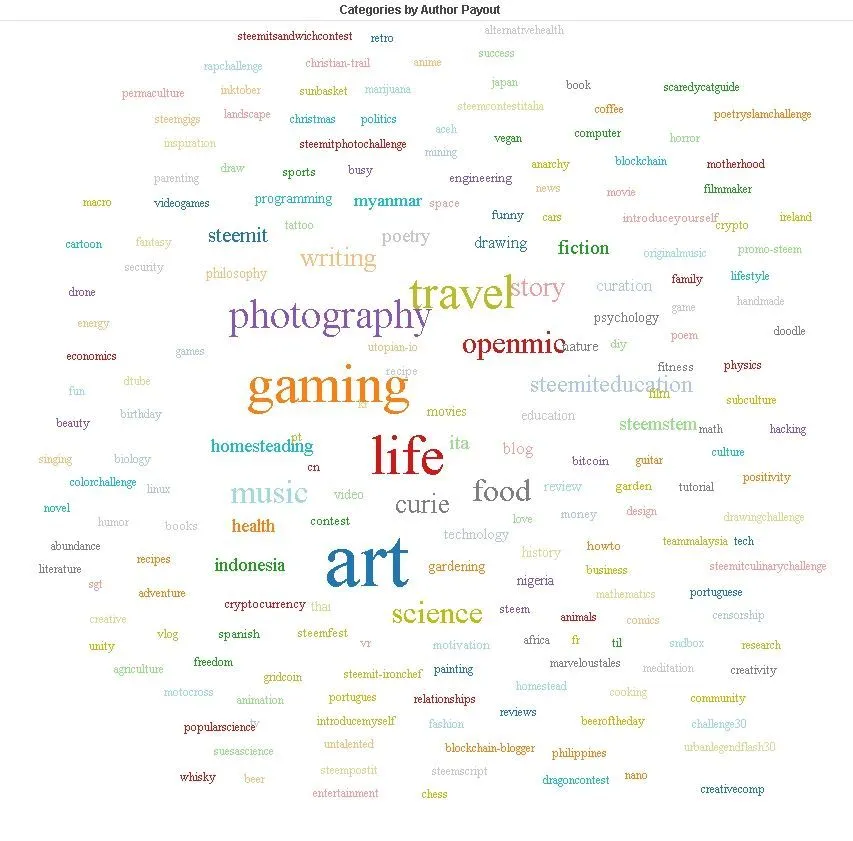
For most up-to-date version of Curie Whitepaper: http://curiesteem.com/#whitepaper
Overview
Curie is a community witness and a meritocratic community curation project. Following are Curie’s main goals:
To discover and reward undiscovered but exceptional content by persistent creators with limited success.
To empower quality curators.
To develop a curation community on Steem.
To build communities.
To serve as a community witness.
All of this with an absolute commitment to meritocracy and transparency with an aspiration towards zero corruption.
The primary challenge of operating an open curation guild is obvious -- people are going to overwhelm submissions with thousands of low quality posts. The Curie system is thus designed around principles of quality, while at the same time remaining decentralized and transparent.
Curie has two tiers of curation and quality assurance -- Curators and Reviewers. Curators find posts, reviewers verify and vote on the posts. Curators receive a Curation Score. Curators with a high Curation Score can submit more posts, while curators with low Curation Scores are restricted or disqualified from curation. This ensures only quality content is submitted to Curie, leading to a great degree of efficiency and streamlining of curation operations.
Curators with sustained high curation scores over six months are promoted to being Reviewers, as per demand. Through excellent quality curation, anyone can be a top curator, and anyone can be a reviewer. All thresholds are predetermined, so there’s a great degree of objectivity and meritocracy.
Previously, Curie had completely open submissions. However, this proved to be unsustainable due to unmanageable volumes, so currently new curators need to be mentored and recommended by existing curators. Existing curators are offered a generous reward for recommending new curators, to incentivize on-boarding new curators.
By voting on the best undiscovered content on Steem, Curie hopes to keep curators who choose not to collaborate with Curie interested. Curie typically does not upvote a post within the first 150 minutes. This provides a window in which non-Curie curators and curation guilds can vote on quality content by undiscovered authors, with a fair chance that Curie will follow up with a larger vote, thus making their curation rewards worthwhile.
Curie uses streamian.com for main Curie activities of post submission-review process. Curie post submission page can be reached at curiesteem.com or at streamian.com under Curie Guild (only open to Curie curators).
Curie is currently working on developing a front end tool for curators. This front end for Steem is being designed specifically to make curating more efficient with filtering and search feature. Upon completion of this project, new goals will be set to move Curie submission/review process to Curie’s own website.
Curie’s ownership and governance is decentralized, as expected of a community project. Curie earns revenues largely from curation rewards, with author rewards, witness rewards and donations accounting from trace amounts. 100% of all revenues are distributed back to Curie’s contributors.
Curie runs and maintains a community witness under Curie’s official account name @curie. Witness is maintained by a designated witness operator with 24/7 coverage. Major decision making regarding hardforks and parameter changes are made in democratic manner by top curators, reviewers, and operations contributors.
In addition, Curie also supports specific communities and direct curators with smaller votes. This is a developing aspect of Curie, that will be fully implemented once Steemit releases the Communities feature.
Curation Score and Approval Rate
Curation Score makes Curie possible.
After a curator submits a post to Curie, a reviewer verifies its quality before voting on it. For some posts, the reviewer may seek second or third opinion from fellow reviewers. Poor quality submissions are disapproved by reviewers.
Each week, curators receive curation scores based on their performance. Curation Score is number of posts approved multiplied by approval rate squared. Approval rate is the percentage of total submissions made by each curator which are approved. There’s an emphasis on quality, while at the same time incentivizing regular submissions.
Approval Rate = (Number of posts approved) / (Number of posts submitted)
Curation Score = (Number of posts approved) * (Approval Rate * Approval Rate)
Based on their Curation Score, each curator is set a certain submission limit for the following week in a tiered submission limit structure. Top curators have unlimited submissions available, while poor curators are restricted and ultimately disqualified from submitting to Curie.
The criteria for each tier are predetermined by reviewers, depending on Curie’s voting power budget.
Reviewers
Long term top curators qualify for becoming reviewers. As with Curation Scores, there’s a predetermined qualification criteria for reviewer qualification. Currently, this is 200 Curation Score and 95% Approval Rate over a period of 6 months.
Long term dedicated curators are some of the most trustworthy people, who will never risk any abuse. However, other reviewers and top curators are free to question reviewers’ actions.
Reviewers can continue submitting to Curie. However, their submissions must be reviewed by a different reviewer.
Direct curators
Likewise, long term top curators qualify for a direct follow. Direct follow curators have their voting budget and follow % restricted in a tiered manner, based on their historical performance.
Direct curation is more efficient and streamlined as for excellent curators a review is mostly unnecessary, and thus reviewers don’t need to review or be paid.
Direct curators can continue submitting to Curie, as their votes are limited.
Curator Recommendations
As part of Curie’s primary goals, discovering and empowering promising curators is essential for the continuation of Curie. An open submission platform has proven to be unsustainable with Steem’s growth. As a result Curie has developed a Curator Recommendation program.
Under the Curator Recommendation Program top curators, reviewers and curators with direct follow can recommend new curators. Recommended new curators must be bonafide and engaged members of the Steem community (no sock-puppets, nepotism, etc). Recommenders may develop their own process for selection and mentoring and can use #curie channel to solicit applications for curators. Once the new curator is verified by a reviewer, they’ll be added to the platform. If a reviewer recommends a new curator, another reviewer must verify the recommendation.
New curators are required to maintain a minimum Curation Score based on guidelines. Successful recommendations will earn the recommender a reward. Recommender may earn higher reward if the new curator becomes a top curator and maintains top curator status for consecutive weeks as stated in the guidelines. Detailed guidelines for new curator recommendations are posted in Discord chat #curie channel. In the occasion of updates and changes to the curator recommendation guidelines, relevant information in #curie channel is updated as well.
Community Operations
All Curie contributors participate on voluntary basis. Majority of community relations, discussions, and communications happen in Discord chat #curie channel and via @curie blog posts. Every Sunday @curie publishes a Curie Weekly Update post with detailed updates. Also, #curie channel is utilized to post most up-to-date information regarding Curie operations.
Top curators and operations team discuss, develop and implement necessary changes and various projects in private channel. Any other projects besides regular Curie activities that are rewarded are shared proportionately by contributors according to their contributions. Various members are designated to certain duties such as community representatives, general curation, accounts, witness operator, and sub-community curations.
Community curation is an independent wing of Curie. Curie extends support to regional communities such as Malaysian, Italian, Brazilian, Nigerian, Myanmar, Thailand and Laos communities. Although these communities are supported by Curie they operate independently.
Curie also supports independent sub-community curators based on categories such as Gaming, Education, Homesteading, Science, and Music categories.
Community Witness
The team here at Curie is continually expanding in order to provide one of the best Curation services for new and upcoming authors on Steem and an important part of this expansion is the upkeep of the witness and seed node. @curie witness will be run in terms of supporting hardforks and witness parameter changes as following.
Voting for hardforks and parameter changes:
Whenever a new hardfork is proposed or a parameter change is suggested, a new voting process will begin. Witness operator (@Locikll) will take informed votes from top curators, reviewers and operators for whether or not they support the hardfork or parameter changes. These will be totaled and result of which will be the action of our witness node. This action, once taken, will then be posted on the weekly update post following the changes. Curie is here to support the community and being a witness is something we take very seriously as it is the foundation and continuity of the Steem blockchain.
Specs and Servers:
Curie has two servers running our witness nodes and voting/reward tracking scripts.
Main Node: Running on a 4 core, 8 thread processor, 32gb Ram, 2x 500gb SSDs @ 6 Gb/s with a 1Gbit/s port guaranteed.
Backup Node: Running on a 4 core, 8 thread processor, 32gb Ram, 2x 250gb SSDs @ 6Gb/s with a 1Gbit/s port guaranteed.
Full Node: TBA
Backup Full Node: TBA
Seed node: Running on a 2 core 4 thread processor, 12gb Ram, 250gb SSD and 5TB Traffic. This is currently used for supplementing our full node and can be connected to at seed.curiesteem.com:2001
Resource Management and Guidelines
In the world of Curie, there are two precious resources - voting power and money. All of Curie’s decision are taken to get the best out of available voting power. This means Guidelines are set to narrow our focus, and reward the best posts within the guidelines. Guidelines also change with the state of the Steem ecosystem, number of quality posts submitted, etc. Beyond the guidelines, reviewers must constantly adjust their “bar for quality” given the number and quality of submissions and voting power available.
List of the current guidelines can be found in Discord chat #curie channel and always kept up-to-date.
Money is simpler - Curie simply pays out all revenue to contributors. If revenues are low, contributors are paid less. If there’s a sudden increase in revenue, Curie will offer high rewards, operating at a loss till the balance sheet is, well, balanced. As mentioned previously, Curie’s revenues largely come from curation rewards, but also trace amounts of witness rewards, author rewards and donations.
Manifesto
Curie believes in absolute meritocracy with no compromises or scope for bias and corruption. To this end:
Curie is a community project operated and owned entirely by the community. 100% of all revenues and holdings will be distributed back to Curie contributors.
Curie will remain apolitical and unbiased.
Curie will never vote for its own posts.
Curie will never solicit anything from any contributor or beneficiary. (E.g. Curie will never ask authors to buy votes, Curie will never ask curators to pay for submissions, Curie will never ask reviewers to follow its trail, etc. All votes given and all curation will be purely on merit.)
All Curie contributors follow the same rules, no one is beyond reproach.
Governance
Curie operates with a tiered decentralized governance system.
The Curie community at large can offer feedback, suggestions or file grievances in the #curie channel or reply to the @curie Steem account.
Regular top curators can discuss all matters, and come to a consensus on strategic decisions in a private channel for top curators. Witness decisions are also taken by regular top curators. Final implementation by witness operator (currently @locikll).
Importantly, all contributors can be replaced with consensus from top curators without friction.
Reviewers discuss operational matters, with implementation by the top reviewer (currently @alcibiades).
All financial transactions are handled by an accountant (currently @liberosist).
Community curation is an independent wing of Curie (currently operated by @donkeypong and @kevinwong).
Achievements
Curators paid - ~1,000
*There were other accounts used for Curie before the @curie account.
Posts Upvoted by previous accounts: +/- 800
Author Payout on posts upvoted by previous accounts: +/- 30,000
Unique Authors Upvoted by previous accounts is the low end of estimated 1,000 - 1,500 range
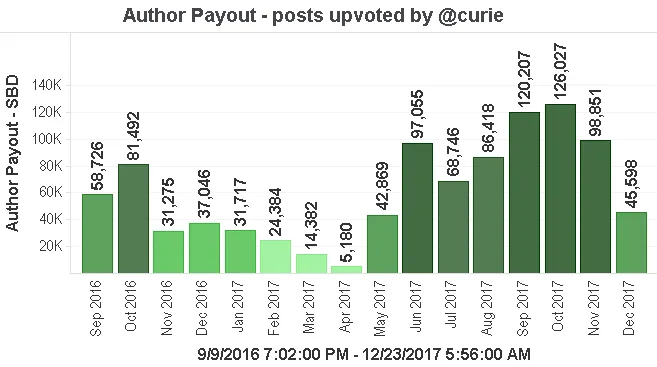
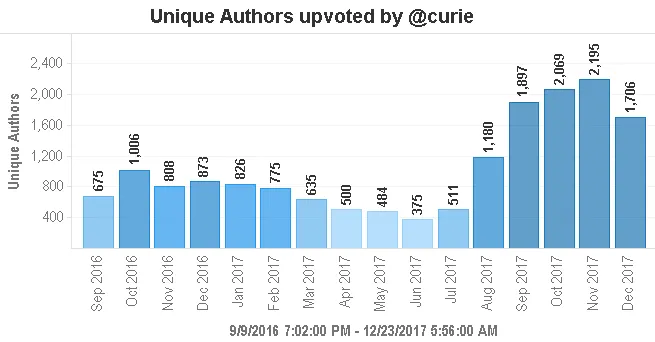
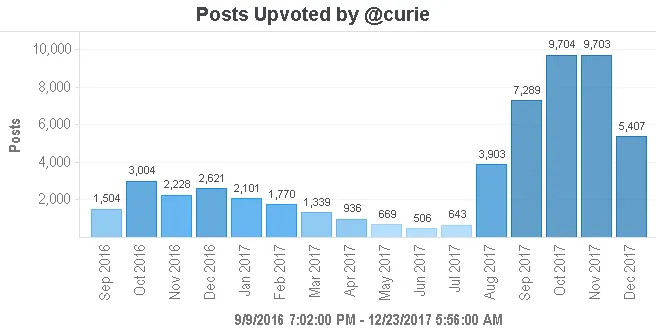
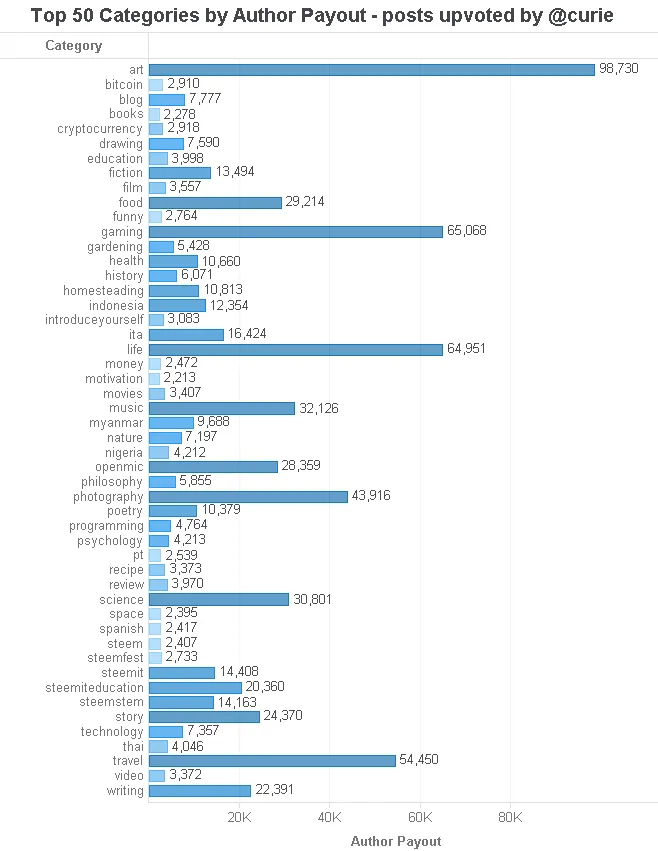
The above data was pulled from SteemSQL 12/23/2017 9:00 AM
Post payout figures marked “SBD” are the USD equivalent of the post at the time of payout; assuming SBD = ~USD 1